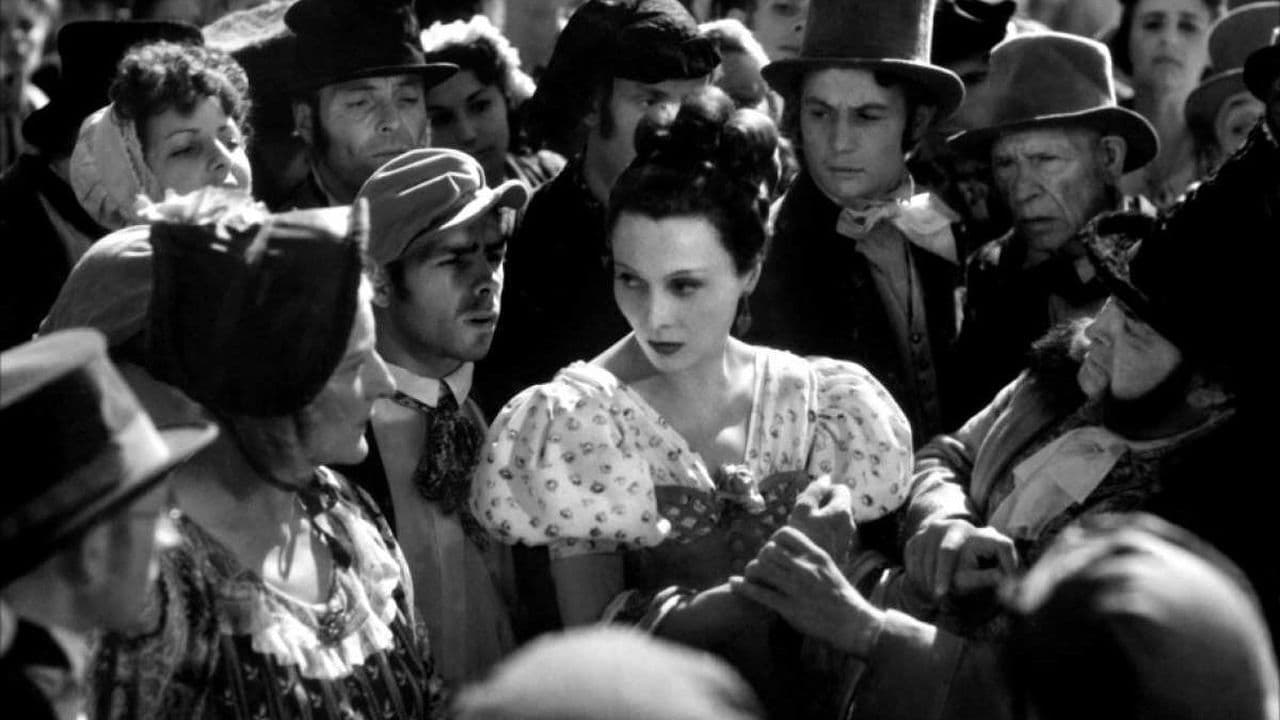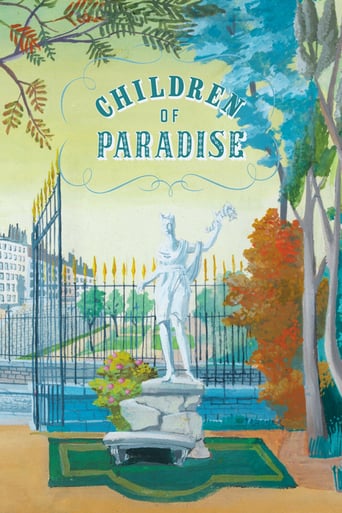

That "Les enfants du paradis" (1945) exists at all is remarkable for two reasons, basically a consequence of one thing, the war. Firstly, that it exists as a film that we can still watch and enjoy, and that it was made in the first place, let alone survive, is miraculous. But secondly, and just as importantly, it's remarkable that it exists as it is, vivacious, energetic, fun, interested in the art of filmmaking. In this respect it reminds me of Vigo, who made "L'Atalante" (1934) knowing he'd die sooner rather than later. The tragedy is tragic, the comedy is comic – everything works and it's impossible to think how cohesive the film is, considering it was made over several years. In other words, how amazing to have a film made in the bleakest of circumstances that still radiates with so much life. After the curtain literally opens the viewer is treated to three hours of the most amazing drama, comedy and visual filmmaking, as well as clever storytelling. We are thrown in the middle of a street, where everyone is giving a performance: Lemaître flirts, Lacaneire gives a monologue (underlined by Garance, who says listening to him is like watching a play), and Baptiste, while acting, witnesses a crime and gives a performance of it in mime. The blind man isn't really blind but merely acting, and later on the love Baptiste and Lemaître have for Garance becomes a play not only once but twice, the latter instance written by some rather ordinary bloke called William-something.It's ironic that I have previously tried to watch the film at least twice, being unable to continue beyond the first twenty minutes (the reasons for this might not be numerous but too domestic to bother you with). But having now watched the film in its entirety, its flow and rhythm makes the time fly. In this respect it's very much like other "longer" epics ("Shichinin no samurai", "Lawrence of Arabia") that are somehow condensed into a speck of time, or should we say timelessness. I can't wait to see it again, which leads to the one teeny-weeny problem we fans have, because —Shamefully the film has been treated with a terrible high definition transfer of the film, and luckily this has been well-documented. Pathé apparently created a 4K scan of the original nitrate negative in 2011 (the work performed at L'Imagine Ritrovata in Bologna, Italy) and then reconstructed and restored in Paris by Eclair Laboratories. But what we have on the Blu-ray is far from wonderful, and only makes one wonder what the 4K scan might have looked like before the terrible digital noise reduction that's only matched by other similar disasters done in DNR to great films ("Le samouraï" and "Madame De..." come to mind, the former also a Pathé resto). The Criterion Collection disk in Region A suffers from the exact same problems as the Second Sight in Region B. I hope we won't have to wait for a long time to get an edition of this film that it greatly deserves.
... View MoreShot during the German-occupation of France, Children Of Paradise is a film where its historical context feeds into its point and purpose. While on-screen it featured aristocrats concerned with love, on set the crew were hiding from the Nazis and concerned with their next meal. It's a surprise that their anxiety didn't transfer over onto the otherwise leisurely film. It's unusually long, especially as it's in two parts where the first ends rather anti-climatically. But its images are beautifully textured, especially in its simple but adventurous shooting. However, although the network of characters is great, I was never too invested in the protagonist or the theme. Instead, it's all about its lush bittersweet tone and that's exactly how its theme is treated. It's a good film to watch in reference to those it inspired.8/10
... View MoreWhen a film has a near-mythical reputation, one often fears it will not live up to its reputation. Happily, this is not the case with Les Enfants du Paradis. It most certainly lives up to its reputation as one of the greatest films ever made.Most people are aware of the stories surrounding the production of this film during the Occupation and it is extraordinary that such a work of art was completed under such trying conditions.The main theme of the film is that truly satisfying love remains just out of reach. The main characters are involved in a series of liaisons that explore their differing romantic needs. Ultimately, none of them find fulfillment.The epic scale of the film and the colourful array of characters would be worthy of Victor Hugo or Charles Dickens. The depth of the characterisation was unprecedented at the time and would saw cinematic art raised to a whole new level.The character of Baptiste is central to the story; he is a sad clown both on and off the stage as his hesitation and shyness lead to him losing his one true love. His unhappy love life ironically contrasts with his growing fame as a genius of mime. The nearest equivalent to Baptiste's plight is perhaps that of the gatekeeper's son, John Chivery, in Dicken's masterpiece, Little Dorrit.Garance is selfish in her rejection of Baptiste yet finds some small degree of redemption on seeing his child and feeling sympathy for it.The film contains many plays within plays and virtually every style of performance art is utilised, from pantomime to dance, from Shakespearian tragedy to street theatre. (As an aside, the film also covers how mime evolved from a crude form of mass entertainment to the sophisticated French cultural art it is today. Indeed, the mime performances presented in the film are sublime.) The notion of plays within plays is also reinforced by the device of the curtains raising and falling on each act of the film itself. We are aware that we are watching actors playing actors, yet we are still drawn into their world and the truths they present to us.A delightful moment in the film is when the Shakespearian actor decides he prefers realistic stories, if only two acts long, that contain the truth, perhaps an ironic reference to the two-part Les Enfants du Paradis itself which maybe the scriptwriters were realising conveyed an abundance of truth.Despite its long running time, the film maintains a good pace and never slackens into tedium. The various threads are drawn together in towards the inevitable but deeply satisfying conclusion. None of the characters will ever find happiness for true romantic love is unattainable, the stuff of plays and fictions only. Yet, their striving for it is what gives them impetus. A beautifully ironic moment is when Baptiste, the great clown, is prevented from catching up with Garance when she leaves for the last time, by a mocking array of tacky imitation carnival clowns. His own personality is mirrored back at him and it is this that prevents him ever reaching his one true love.The tone of the film mixes the serious and comic superbly as, again, a nineteenth century literary master such as Dickens or Hugo would have done as the lives of the impoverished, cunning street performers is turned into high art and film itself reaches the same height as great literature.The cinematography is subtly and neatly summarises all of the lessens learned in the half-century since the birth of the art form.To summarise, this truly is one of the greatest films ever made, both for its execution, use of literary and cinematic techniques and the depth of its themes. Essential viewing.
... View MoreIt's funny how the French have always kept on making makes like this throughout the years and still have a sort of monopoly on these type of movies this present day.It's a movie about one of the oldest and most eternal themes; love. It's not really an happy movie about love though and the movie is filled with characters who are all longing for their true love, while they due to the circumstances of life, are stuck with others. This theme and concept also raises a whole lot of other themes in the movie such as jealousy, envy and just blind hate.It's a really fine made movie, that also truly is beautiful looking. Once you start looking more into the movie you'll notice and appreciate more the movie its camera-work and also good quick style of editing, in which the French always have been pioneers at.It's a French period piece, so you can expect lots of god looking costumes and silly looking haircuts. It's all grand and also expensive looking, which is quite amazing actually, considering that this movie got made in Nazi-occupied France at the time. Must have also been one of the reasons why production for this movie lasted 18 months., which especially for those days was extremely long for any sort of movie.It's a movie that centers around its many characters, which means that the actors are given plenty of room to give some powerful and impressive performances. The movie does really feel like a Shakespeare play at times, also since Shakespeare's plays themselves play an actual role in the movie.The movie gets better as it more and more starts to progress. Caling this movie therefore overlong is a bit uncalled for, even though with its over 3 hours of running time it's still a long movie of course. The movie however is a two parter and I also wouldn't be surprised if these two parts also got shown separately at its initial release.9/10http://bobafett1138.blogspot.com/
... View More